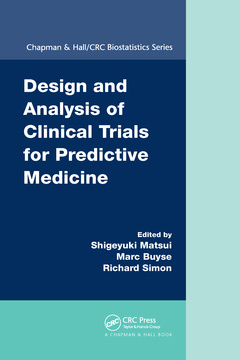Description
Design and Analysis of Clinical Trials for Predictive Medicine
Chapman & Hall/CRC Biostatistics Series
Coordinators: Matsui Shigeyuki, Buyse Marc, Simon Richard
Language: English
Subjects for Design and Analysis of Clinical Trials for Predictive...:
Keywords
Progressive Disease; Accelerated Failure Time Models; Clinical Trials; Adaptive Signature Design; Phase I Trials; Pi Pi Pi Pi Pi; Phase II Trials; Prostate Cancer Dataset; Phase III Trials; Predictive Biomarkers; Clinical Trials and Biomarkers; Genomic Signatures; Clinical Trials of Targeted Agents; Pi Pi Pi Pi; Gene Signatures in Clinical Trials; High Dimensional Genomic Data; Pi Pi Pi; Brier Scores; Biomarker Subgroups; Roc Curve; Higher Dimensional Setting; Multiarm Trials; POC Trial; EGFR Fish; Adaptive Randomization; Sensitive Subset; Battle Trial; AIC Model Selection; True Endpoint; Early Breast Cancer; TMPRSS2 Erg Fusion; Marker Positive Patients
Publication date: 12-2020
· 15.6x23.4 cm · Paperback
Publication date: 04-2015
381 p. · 15.6x23.4 cm · Hardback
Description
/li>Contents
/li>Readership
/li>Biography
/li>
Design and Analysis of Clinical Trials for Predictive Medicine provides statistical guidance on conducting clinical trials for predictive medicine. It covers statistical topics relevant to the main clinical research phases for developing molecular diagnostics and therapeutics?from identifying molecular biomarkers using DNA microarrays to confirming their clinical utility in randomized clinical trials.
The foundation of modern clinical trials was laid many years before modern developments in biotechnology and genomics. Drug development in many diseases is now shifting to molecularly targeted treatment. Confronted with such a major break in the evolution toward personalized or predictive medicine, the methodologies for design and analysis of clinical trials is now evolving.
This book is one of the first attempts to contribute to this evolution by laying a foundation for the use of appropriate statistical designs and methods in future clinical trials for predictive medicine. It is a useful resource for clinical biostatisticians, researchers focusing on predictive medicine, clinical investigators, translational scientists, and graduate biostatistics students.
INTRODUCTORY OVERVIEW. Clinical Trials for Predictive Medicine: New Paradigms and Challenges. An Industry Statistician’s Perspective on Personalized Health Care Drug Development. Analytical Validation of In Vitro Diagnostic Tests. EARLY CLINICAL TRIALS USING BIOMARKERS. Phase I Dose-Finding Designs and Their Applicability to Targeted Therapies. An Overview of Phase II Clinical Trial Designs with Biomarkers. Bayesian Adaptive Methods for Clinical Trials of Targeted Agents. Outcome-Adaptive Randomization in Early Clinical Trials. Challenges of Using Predictive Biomarkers in Clinical Trials. PHASE III RANDOMIZED CLINICAL TRIALS USING BIOMARKERS. Comparison of Randomized Clinical Trial Designs for Targeted Agents. Phase III All-Comers Clinical Trials with a Predictive Biomarker. Evaluation of Clinical Utility and Validation of Gene Signatures in Clinical Trials. ANALYSIS OF HIGH-DIMENSIONAL DATA AND GENOMIC SIGNATURE DEVELOPMENTS. Statistical Issues in Clinical Development and Validation of Genomic Signatures. Univariate Analysis for Gene Screening: Beyond Multiple Testing. Statistical and Machine-Learning Methods for Class Prediction in High Dimension. Survival Risk Prediction Using High-Dimensional Molecular Data. RANDOMIZED TRIALS WITH BIOMARKER DEVELOPMENT AND VALIDATION. Adaptive Clinical Trial Designs with Biomarker Development and Validation. Development and Validation of Continuous Genomic Signatures in Randomized Clinical Trials. EVALUATION OF SURROGATE BIOMARKERS. Biomarker-Based Surrogate Endpoints.
Shigeyuki Matsui is a professor in the Department of Biostatistics at Nagoya University Graduate School of Medicine in Japan. He is also a visiting professor at the Institute of Statistical Mathematics. Dr. Matsui has served as council and nominating committee member of the International Biometric Society. He is currently council of the Biometric Society of Japan (BSJ) and editor-in-chief of the Japanese Journal of Biometrics. He is the recipient of the 2014 Award from the BSJ. Dr. Matsui is also a frequent reviewer commissioned by government and advisor to pharmaceutical companies in Japan. He holds degrees in engineering from the Tokyo University of Science in Japan.
Marc E. Buyse is the founder of the International Drug Development Institute in Louvain-la-Neuve, Belgium and of CluePoints Inc. in Cambridge, Massachusetts. He is also an associate professor of biostatistics at Hasselt University in Belgium. He was president of the International Society for Clinical Biostatistics, president of the Quetelet Society, and fellow of the Society for Clinical Trials. He worked at the European Organization for Research and Treatment of Cancer in Brussels and at the Dana Farber Cancer Institute in Boston. He holds degrees in engineering and statistics from Brussels University, management from the Cranfield School of Management in the UK, and a doctorate in biostatistics from Harvard University.
Richard M. Simon is chief of the Biometric Research Branch at the National Cancer Institute in Bethesda, Maryland. He leads a multidisciplinary group of scientists developing and applying methods for the application of genomics to cancer therapeutics. Dr. Simon is the architect of BRB-ArrayTools software used for the analysis of microarray and digital expression, copy number, and methylation data. He is the recipient of the 2013 Karl E. Peace Award for Outstanding Statistical Contributions for the Betterment of Society and is the author or coaut




